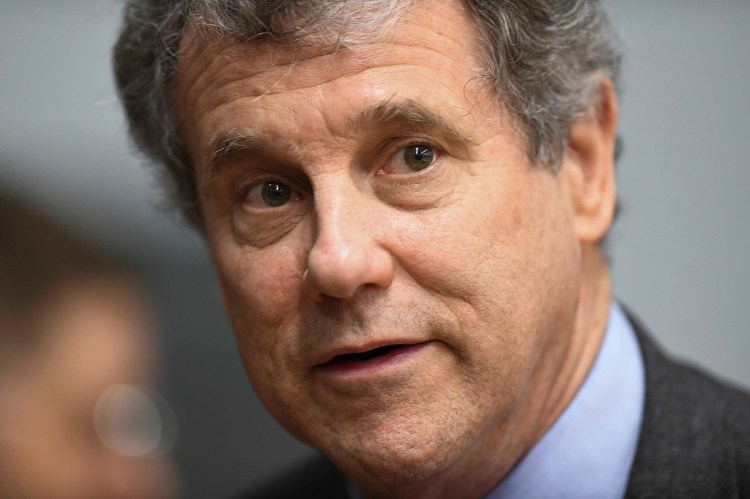Sen. Sherrod Brown of Ohio announced Thursday that he will not seek the presidency, a decision he said came after a tour of early primary states left him more confident that his party was focusing more on labor and workers than it had in 2016.
“I will do everything I can to elect a Democratic President and a Democratic Senate in 2020,” Brown said in a statement. “The best place for me to make that fight is in the United States Senate.”
Brown, 66, is the second Democratic senator to pass on a White House bid this week; Oregon’s Jeff Merkley had released a similar statement Monday. Both senators had hired staff in some early states and had begun to sketch out the argument that a populist Democrat with a record of winning white, working-class voters could break the coalition that narrowly elected Donald Trump.
Former New York mayor Michael Bloomberg also announced this week that he would not seek the Democratic nomination.
“Donald Trump has used his phony populism to divide Americans and demonize immigrants,” Brown said in January, as he began his four-state “Dignity of Work” tour. “He uses phony populism to distract from the fact that he has used the White House to enrich people like himself. Real populism is not racist.”
But Brown, who had never seriously considered a presidential bid until urged to do so after the 2016 election, found that he did not have the same investment in a run as other Democrats. He was also encouraged to hear several rival candidates adopt his “dignity of work” motto on the trail, seeing that as evidence that the party was not making the same blunders that it had ahead of Trump’s win.
Brown’s decision may open some breathing room for other Democrats who were making similar, populist arguments and who had overlapping allies in the labor movement and on the left. Allies of Sen. Bernie Sanders (I-Vt.) saw Brown as a potential threat to the Vermont senator’s candidacy, offering Democrats a younger, fresher voice with a record of victories in the Midwest.
“I’d be the only Democrat on that stage who voted against the Iraq War,” Brown told reporters in Selma, Ala. this weekend. “I think I’d be the only Democrat on that stage that came out for marriage equality 20 years ago.”
Brown, like Trump and Sanders, had opposed trade agreements on the grounds that they slighted blue-collar workers in this country and contributed to broad job losses in a swath of states. He praised the president for imposing tariffs on imported steel, which he argued would make U.S. steel companies more competitive and rejuvenate employment in the industry.
But on most other issues, Brown fell in line with the rest of his party and the rest of the presidential field. He stopped short of endorsing Medicare-for-all but supported greater access to national health insurance, a ban on assault weapons, and a version of a Green New Deal. His competitive advantage, to some early-state Democrats, was that he had done so in an increasingly red Ohio.
“I’ve seen so many national Democrats look at this as either you speak to the progressive base or you speak to workers,” Brown said on MSNBC’s “Morning Joe.” “If we have to choose between the two, we lose.”
Brown defined “dignity of work” as ensuring jobs paid enough to live on, that every American could afford health care, education and housing, and that workers had enough control of their schedules to raise a family — a nod toward improving paid family leave policies. He’d also gotten some momentum in the Senate for a child-care subsidy, and he emphasized that Senate work in his decision not to run for president.
Democrats with an eye on control of the Senate may be relieved by Brown’s decision; had he won the presidency, Ohio’s Republican governor would have appointed his replacement. And while it did not become an issue during his exploratory tour, Brown faced Republican attacks in 2018 over his first marriage and subsequent messy divorce, an issue that could have emerged anew had he run for president.
Brown is now married to Pulitzer Prize-winning journalist Connie Schultz, who resigned from the Cleveland Plain Dealer in 2011 because she felt her neutrality would be questioned because of their relationship. She now teaches journalism at Kent State University and campaigned with him in his visits to early states, citing her own blue-collar roots. Both of them, Brown said, would stay active in the Democratic debate.
“We’ve seen candidates begin taking up the dignity of work fight, and we have seen voters across the country demanding it — because dignity of work is a value that unites all of us,” Brown said in his Thursday statement. “It is how we beat Trump, and it is how we should govern. That’s why I’m confident it will continue to be a focus for Democrats in 2020, and I plan on making sure that happens.”
Send questions/comments to the editors.



Success. Please wait for the page to reload. If the page does not reload within 5 seconds, please refresh the page.
Enter your email and password to access comments.
Hi, to comment on stories you must . This profile is in addition to your subscription and website login.
Already have a commenting profile? .
Invalid username/password.
Please check your email to confirm and complete your registration.
Only subscribers are eligible to post comments. Please subscribe or login first for digital access. Here’s why.
Use the form below to reset your password. When you've submitted your account email, we will send an email with a reset code.